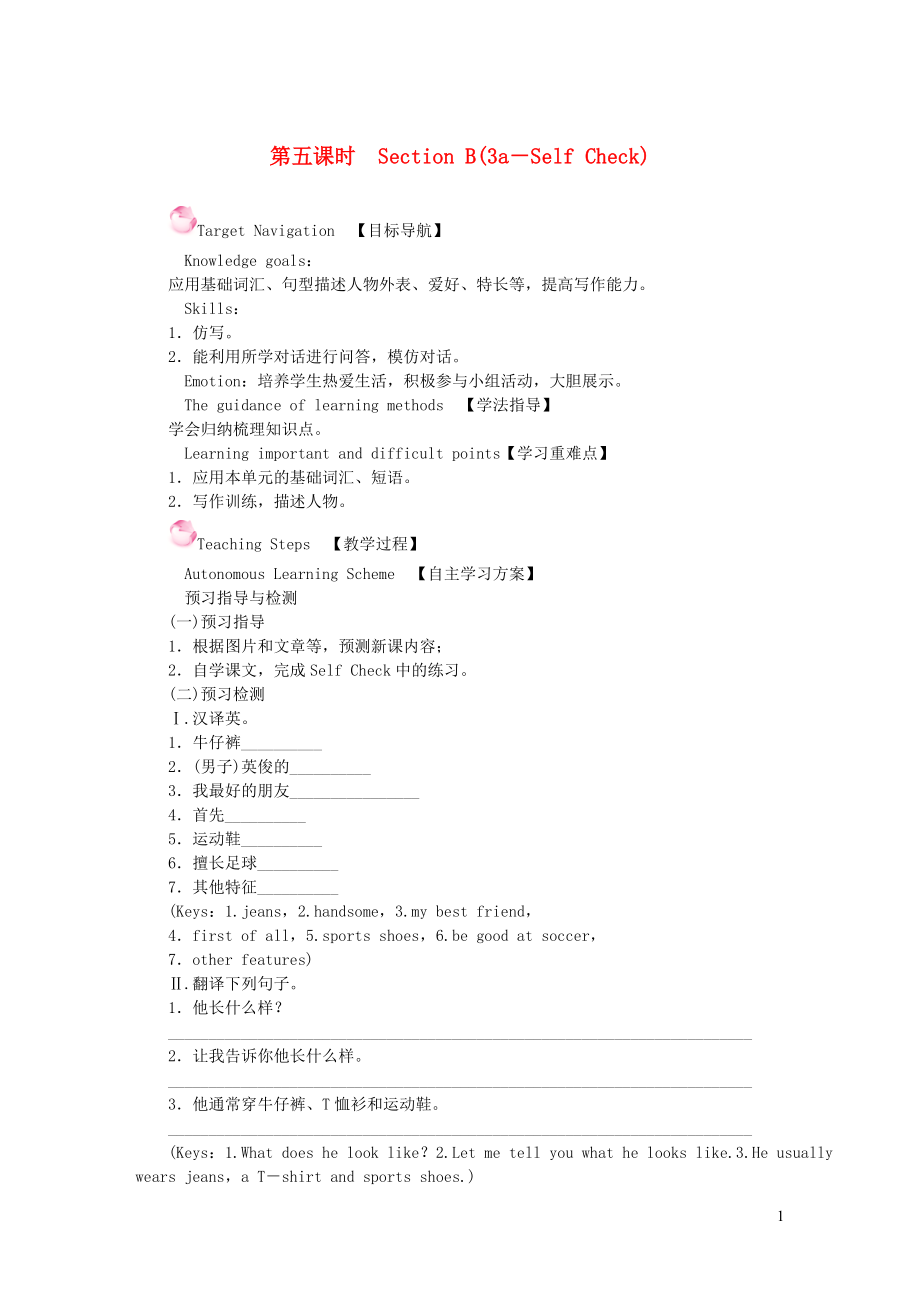《七年級(jí)英語(yǔ)下冊(cè) Unit 9 What does he look like第五課時(shí) Section B(3a-Self Check)教案(新版)人教新目標(biāo)版》由會(huì)員分享����,可在線閱讀,更多相關(guān)《七年級(jí)英語(yǔ)下冊(cè) Unit 9 What does he look like第五課時(shí) Section B(3a-Self Check)教案(新版)人教新目標(biāo)版(4頁(yè)珍藏版)》請(qǐng)?jiān)谘b配圖網(wǎng)上搜索���。
1�、
第五課時(shí) Section B(3a-Self Check)
4
Target Navigation 【目標(biāo)導(dǎo)航】
Knowledge goals:
應(yīng)用基礎(chǔ)詞匯��、句型描述人物外表��、愛好����、特長(zhǎng)等�����,提高寫作能力����。
Skills:
1.仿寫����。
2.能利用所學(xué)對(duì)話進(jìn)行問答,模仿對(duì)話�����。
Emotion:培養(yǎng)學(xué)生熱愛生活�,積極參與小組活動(dòng),大膽展示���。
The guidance of learning methods 【學(xué)法指導(dǎo)】
學(xué)會(huì)歸納梳理知識(shí)點(diǎn)�����。
Learning important and difficult points【學(xué)習(xí)重難點(diǎn)】
1.應(yīng)用本單元的基礎(chǔ)
2�����、詞匯����、短語(yǔ)���。
2.寫作訓(xùn)練����,描述人物�����。
Teaching Steps 【教學(xué)過程】
Autonomous Learning Scheme 【自主學(xué)習(xí)方案】
預(yù)習(xí)指導(dǎo)與檢測(cè)
(一)預(yù)習(xí)指導(dǎo)
1.根據(jù)圖片和文章等���,預(yù)測(cè)新課內(nèi)容���;
2.自學(xué)課文,完成Self Check中的練習(xí)��。
(二)預(yù)習(xí)檢測(cè)
Ⅰ.漢譯英����。
1.牛仔褲__________
2.(男子)英俊的__________
3.我最好的朋友________________
4.首先__________
5.運(yùn)動(dòng)鞋__________
6.擅長(zhǎng)足球__________
7.其他特征__________
(K
3��、eys:1.jeans�����,2.handsome���,3.my best friend,
4.first of all�����,5.sports shoes�,6.be good at soccer,
7.other features)
Ⅱ.翻譯下列句子�。
1.他長(zhǎng)什么樣?
________________________________________________________________________
2.讓我告訴你他長(zhǎng)什么樣���。
________________________________________________________________________
3.他
4�、通常穿牛仔褲��、T恤衫和運(yùn)動(dòng)鞋�。
________________________________________________________________________
(Keys:1.What does he look like?2.Let me tell you what he looks like.3.He usually wears jeans�,a T-shirt and sports shoes.)
Classroom Learning Guidance Scheme 【課堂導(dǎo)學(xué)案】
【探究一】
1.Go through the words in the box
5����、quickly.
2.Fill in the blanks in the passage with the words.Finish 3a.Check the answers.
3.Read the passage together.
【探究二】Writing
1.Think about the questions in 3b.
2.Write a passage about your best friend.Finish 3b.
3.Show time:show your passage to the class.
【探究三】
1.Put the words you lear
6��、ned in different blanks.Finish Self Check:Ex.1.
2.Finish Self Check:Ex.2.Check the answers.
【探究四】合作交流
Group work:分析總結(jié)如何描述某人的外貌特征�。
Notes:________________________________________________________________________
________________________________________________________________________
____________
7�����、____________________________________________________________
【知識(shí)點(diǎn)撥】
多個(gè)形容詞的排列順序�����。
英語(yǔ)中�,當(dāng)名詞有多個(gè)形容詞作前置定語(yǔ)時(shí),這些形容詞的排列順序通常要遵循一定的順序��,不能隨意調(diào)換位置�����。
1.基本順序:限定詞(冠詞�����、指示代詞、物主代詞���、數(shù)詞等)+表示觀點(diǎn)的描述性形容詞+形狀�、大小��、長(zhǎng)短�、高低+年齡、新舊+顏色+國(guó)籍���、地區(qū)+物質(zhì)材料+中心詞�����。
2.口訣1:縣官行令宴國(guó)材(限觀形齡顏國(guó)材)��。
3.口訣2:大小��、形狀�、描述性�,年齡、顏色后跟定�����,產(chǎn)地、材料和用途�����,先后順序已排清��。如:
①一輛昂貴的新型日本跑車
_
8����、_______________________________________________________________________
②一個(gè)又大又圓的紅蘋果
________________________________________________________________________
③漂亮的卷曲的金色長(zhǎng)發(fā)
________________________________________________________________________
Classroom Evaluation Scheme 【課堂評(píng)價(jià)案】
詳見當(dāng)堂訓(xùn)練部分(即學(xué)生用書同步練習(xí)題)���。
Teaching Reflection 【教學(xué)反思】
本節(jié)課是第九單元的總結(jié)復(fù)習(xí)課��,通過Self Check的兩個(gè)活動(dòng)��,歸納梳理描述某人的外貌特征的基礎(chǔ)詞匯和句型�,同時(shí)通過描述你的父母長(zhǎng)什么樣����,運(yùn)用這些詞匯和句型,然后再進(jìn)行3a�,3b的活動(dòng),先通過填詞練習(xí)���,熟悉描述人貌的詞匯�����,最后通過寫關(guān)于你朋友的短文�,運(yùn)用本單元描述某人的外貌特征的詞匯和句型。
 七年級(jí)英語(yǔ)下冊(cè) Unit 9 What does he look like第五課時(shí) Section B(3a-Self Check)教案(新版)人教新目標(biāo)版
七年級(jí)英語(yǔ)下冊(cè) Unit 9 What does he look like第五課時(shí) Section B(3a-Self Check)教案(新版)人教新目標(biāo)版

